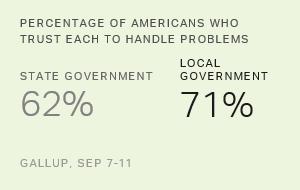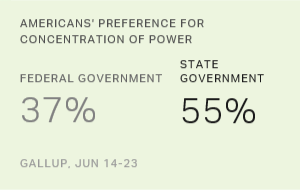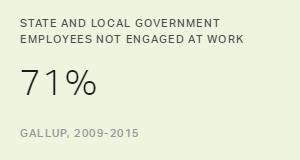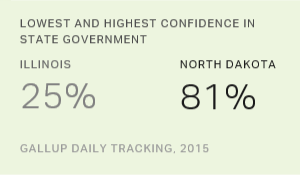Story Highlights
- 71% trust local government, compared with 62% for state
- Republicans have greatest trust in both levels of government
WASHINGTON, D.C. -- For the past 15 years, Americans have expressed more confidence in their local government than their state government to handle problems. Similar to polls since 2013, about seven in 10 (71%) say they have a "great deal" or a "fair amount" of trust in local government to handle problems, compared with about six in 10 (62%) who say the same for their state government.
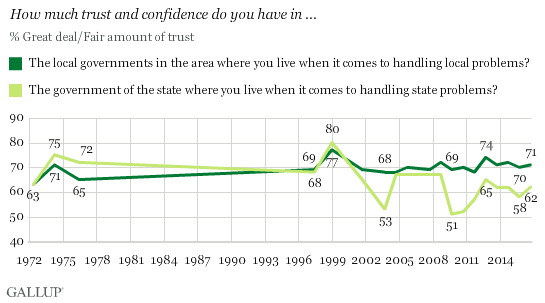
These data were collected as part of Gallup's Sept. 7-11 Governance poll, just two months before a dozen state gubernatorial elections and thousands of state legislative races take place alongside the presidential election.
Americans express much greater confidence in their local and state governments than they do in the executive and legislative branches of federal government. Confidence in state government roughly ties confidence in the judicial branch (61%), including the Supreme Court.
Trust in local government has been fairly steady since Gallup first polled Americans on the topic in 1972, ranging between 63% in that year to as high as 77% in 1998 amid good economic conditions for the country at large. Confidence in state government, however, has varied more, from as high as 80% during the relative good economic times of 1998 to as low as 51% in 2009 as the economy soured after the 2008 Wall Street financial crisis and many states faced revenue shortfalls.
GOP Confidence in State Government Has Waned, but Remains Strongest
From 1997 to 2011, differences in political partisans' views of state government have not varied tremendously -- though Republicans generally displayed slightly greater confidence than Democrats in state government, usually ranging from three to eight percentage points higher. But after losing a large number of governorships in 2008, Republicans have since made a significant rebound, earning a dozen additional state governors' offices, bringing their total to 31.
With so many gubernatorial victories, Republicans' confidence in state government soared past Democrats' in 2012, rising to a 15-point advantage in 2013. Their trust in state government has been tempered in the past three years, however, ebbing from 73% in 2014 to the current 66% -- still slightly higher than for independents (62%) and Democrats (58%). Republicans could give their representation at the state level particular significance because their party is not in control of the presidency, therefore leaving state governors to promote the party's platform as executives of individual states.
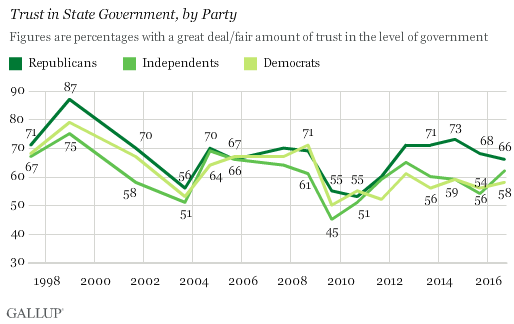
Two-Thirds or More of Each Party Group Expresses Trust in Local Government
Similar to their confidence in state government, Republicans have generally expressed more trust than Democrats in local government -- this was the case in all but three polls Gallup has taken since 1997. Overall, however, solid majorities of all three party groups have expressed confidence in their local governments.
Currently, three in four Republicans say they have a great deal or a fair amount of confidence in local governments, compared with 71% of independents and 66% of Democrats.
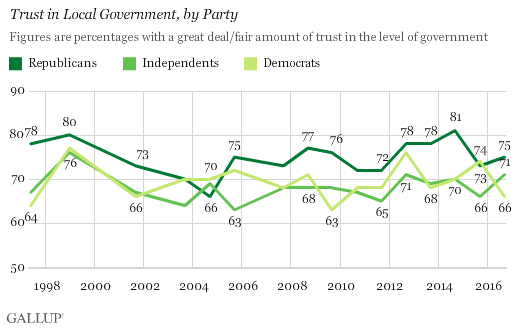
Bottom Line
Despite Republicans' high trust in state and local governments, even independents and Democrats have had fairly high confidence in these lower levels of government -- especially compared with their confidence in the federal government's executive and legislative branches. Majorities of each party group have had confidence in both the state and local levels of government in Gallup's trend in nearly every poll since 1997.
This is likely related to the increased value of state residents' votes in local and state elections, paired with the more direct interaction they have with these governments in their everyday lives. This greater familiarity may make lower levels of governments seem more trustworthy.
Historical data are available in Gallup Analytics.
Survey Methods
Results for this Gallup poll are based on telephone interviews conducted Sept. 7-11, 2016, with a random sample of 1,020 adults, aged 18 and older, living in all 50 U.S. states and the District of Columbia. For results based on the total sample of national adults, the margin of sampling error is ±4 percentage points at the 95% confidence level. All reported margins of sampling error include computed design effects for weighting.
Each sample of national adults includes a minimum quota of 60% cellphone respondents and 40% landline respondents, with additional minimum quotas by time zone within region. Landline and cellular telephone numbers are selected using random-digit-dial methods.
View complete question responses and trends.
Learn more about how the Gallup Poll Social Series works.
